| dc.description.abstract | Background
Some children and adolescents with brain damage and their families use intensive rehabilitation programs like Advanced Bio-Mechanical Rehabilitation, the Institutes for the Achievement of Human Potential program, the Family Hope Center program and the Kozijavkin method. However, the programs are controversial among medical professionals and represent major costs to health care services and society.
Objective
In this health technology assessment, we assessed the clinical efficacy and safety of intensive programs for children and adolescents with brain damage, performed a health economic evaluation related to the programs and two Norwegian regional programs as comparator, and highlighted some ethical challenges.
Method
Clinical efficacy and safety: We performed systematic literature searches in nine databases for controlled studies on the above-mentioned intensive habilitation programs. We critically assessed studies using the Risk of Bias-tool, descriptively summarized outcome data and graded overall results using Grading of Recommendations Assessment, Development and Evaluation.
Health Economic Evaluation: We described costs of the four intensive habilitation programs, and two Norwegian intensive rehabilitation program as comparator. Cost description included an estimate for total costs and mean costs per participant with family. We described costs in a healthcare perspective, with a time horizon of 1 year.
Ethical assessment: We used a stepwise method that included identification of stakeholders, identification of moral questions, illuminating questions through literature search, hearings and user involvement, and summarization of process.
Results
Clinical efficacy and safety: We found three small controlled trials involving 94 participants that assessed the effectiveness of the Institutes for the Achievement of Human Potential program and the Family Hope Center program compared to standard treatment. Over time, none of the studies found difference in gross motor, fine motor and cognitive function between the interventions and control conditions but the evidence had very low quality assessed by the Grading of Recommendations Assessment, Development and Evaluation (GRADE). None of the studies assessed safety outcomes of the programs.
We found no controlled studies on efficacy and safety of Advanced Bio-Mechanical Rehabilitation and the Kozijavkin method.
Health Economic Evaluation: In 2015, the total costs of the four intensive programs were 31,876,669 Norwegian kroner. The mean cost per participant with family was 426,146 Norwegian kroner. Two Norwegian intensive programs used as comparison had in 2015 an estimated total cost of 9,675,202 million Norwegian kroner and a mean cost per participant with family of 225,005 Norwegian kroner.
Ethical assessment: A practice in which patients participating in foreign intensive habilitation programs receive public funding for both participation in and training between program participation may legitimize the use of non-documented treatment and in some cases impair patients' possibility for normal social participation.
Discussion
Clinical efficacy and safety: Despite thorough searches in nine databases and review of the programs' websites, we found only three studies with control groups on the Institutes for the Achievement of Human Potential program and the Family Hope Center program. Two of the studies were over 35 years old. The included studies used different tools for evaluation of efficacy, and lack of description of the variation in outcomes data (standard deviation or confidence interval) in two of the studies prevented synthesizing of data in meta-analysis. We identified no controlled studies on Advanced Bio-Mechanical Rehabilitation or the Kozijavkin method.
Health Economic Evaluation: Absence of guidelines and lack of documentation for effectiveness of the foreign intensive habilitation programs indicated that it was not relevant to perform a full economic evaluation.
Ethical assessment: Extensive use of foreign habilitation programs raises several moral questions. Our goal was to shed light on some ethical questions related to this issue, but the topic could have been wider illuminated in a complete ethical analysis.
Conclusion
None of the studies on the Institutes for the Achievement of Human Potential program and the Family Hope Center program found difference in the effect on gross motor, fine motor and cognitive function over time, compared to standard treatment, but the quality of the documentation was very low. Lack of data prevents us from concluding on safety of the Institutes for the Achievement of Human Potential program and the Family Hope Center program. Lack of controlled studies indicates that we cannot conclude on the efficacy and safety of Advanced Bio-Mechanical Rehabilitation and the Kozijavkin method.
The mean cost per patient with brain damage and their family is about twice as high for foreign habilitation compared to two Norwegian intensive habilitation programs.
Based on an ethical perspective, the practice of public funding of participation in foreign habilitation programs may contribute to legitimization of non-documented treatment. Participation in some intensive programs can also reduce children and families' opportunities for normal social interaction and self-expression. Despite this, many parents experience that they are well taken care of in the programs. | |
